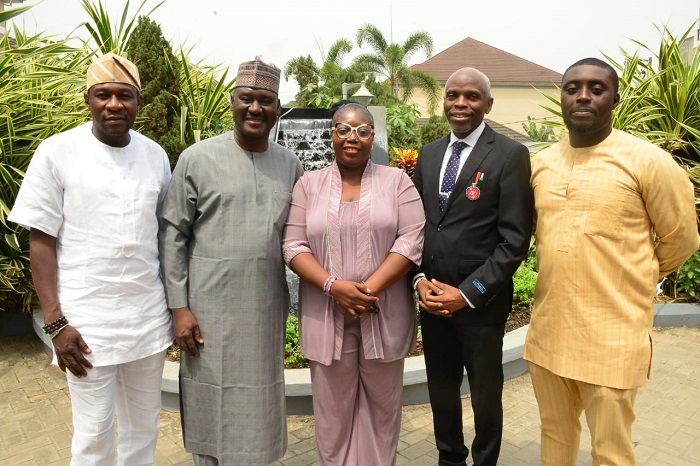L-R: General Secretary, West African Society Forum (WACSOF) Kopep Dabuget, Executive Director, Civil Society Legislative Advocacy Centre (CISLAC), Auwal Ibrahim Musa Rafsanjani, Guest Speaker/ Group Features Editor, Thisday Newspapers, Chiemele Ezeobi, Secretary General, Nigeria Network of NGOs, Barr. Ayo Adebusoye and Senior Programme Officer, Transition Monitoring Group (TMG), Solomon Adoga during a media interactive meeting on the State of ECOWAS and Regional Integration in Africa organised by CISLAC, WACSOF and TMG held in Lagos on Monday February 5th, 2024.
The stability of the Economic Community of West African States (ECOWAS) as a regional bloc of economic, human and political development has been threatened in recent years by political instability and security challenges in some member states.
Since August 2020, the region has recorded several coups where democratic governments have been toppled and constitutional procedures trampled.
To address these challenges, civil society organisations (CSOs) in West Africa, particularly in Nigeria, including the West African Civil Society Forum (WACSOF), Civil Society Legislative Advocacy Centre (CISLAC), the Transition Monitoring (TMG), the West Africa Network for Peacebuilding (WANEP-Nigeria), Nigeria Network of NGOs (NNNGOs) and Human and Environmental Development Agenda (HEDA) organized a CSOs and Media Interactive Meeting on State of ECOWAS and Regional Integration in West Africa.
The meeting which held in Lagos on Monday, 5th February 2024 centered on the state of affairs within ECOWAS and measures required to avoid further instability and possible disintegration of the regional bloc which before now had been regarded as the template for regional integration in Africa.
The CSOs and media organisations acknowledged the relevance of ECOWAS to the integration of the region with notable achievements among which include the free movement of persons, the trade liberalization scheme and, above all, the establishment of the Customs Union, with the entry into force of the Common External Tariff (CET) in 2015 which have contributed to furthering integration of the region.
Observations
- Given the security challenges in the region, the withdrawal of Mali, Burkina Faso and Niger from the ECOWAS will cause set back to the gains of peace and security efforts under the direction of regional authority especially in the fight against terrorism.
- The withdrawal defeats the purpose of regional economic corporation within the ECOWAS bloc including the establishment of an African Continental Free Trade Area. It will adversely affect the life and livelihood of the citizens of West Africa.
- It will further exacerbate corruption, illicit financial flows (IFFs) and drug and human trafficking across the borders
- Democracy in West Africa has become more fragile despite the principles of zero tolerance for unconstitutional change of government, tenure elongation, fraudulent elections and bad governance contained in the 2001 ECOWAS Supplementary Protocol on Democracy and Good Governance
- The culture of impunity and disregard for the rule of law by political elites in West Africa has continued to weaken state institutions.
Recommendations
- ECOWAS should urgently call fo3r an emergency extra ordinary summit to look into the state of affairs in the region in order to prevent further threats of disintegration.
- Immediate dialogue must be pursued with the affected countries and all sanctions be removed to pave the way for genuine reconciliation. The Authorities of Niger, Mali, and Burkina Faso to rescind their decisions to withdraw from ECOWAS because of obvious beneficial reasons. State and non-state actors in the region should intensify engagements towards ensuring a more united ECOWAS.
- ECOWAS should work with the authorities in these countries to urgently adopt transition plans with a clear roadmap for a quick restoration of democratic order.
- We urge the military authorities in the affected countries to refrain from attempts to transform themselves from military to civil rulers.
- ECOWAS should work with the Authorities in these countries to ensure free, fair, and credible elections. We urge CSOs and media to engage positively and ensure electoral transparency, popular participation and inclusion in the electoral process.
- In the spirit of the ideals of ECOWAS VISION 2050, we call on ECOWAS to speed up the review of the ECOWAS supplementary protocol on good governance to prevent tenure elongation, electoral manipulation and rigging, curb unconstitutional changes of government.
- With the adoption of Vision 2050, ECOWAS Parliament should begin to have elective representatives rather than appointive representation. This will contribute to making it a truly ECOWAS of the peoples.
- ECOWAS should operationalize the consultative aspects of the functions of the ECOWAS National Units so as to ensure connection with the citizens of Member States in the implementation of ECOWAS Agreements at the national levels, in line with the spirit of the ECOWAS Vision 2050
- Civil society and media should embark on peace missions to consult key stakeholders in the affected countries to provide support towards quick return to constitutional democracy.
- ECOWAS, Civil society and media should demand for quick, transparent, inclusive, free, fair and credible election in Senegal as earlier scheduled. They should also condemn the arbitrary arrest and banning of political opposition from contesting the election.
- After successful resolution with the aggrieved countries, ECOWAS should support the member countries to strengthen their capacity in responding to present and emerging threats including activation of early warning and response capabilities.
Signed by
- Kop’ep Dabugat – West African Civil Society Forum (WACSOF)
- Auwal Ibrahim Musa (Rafsanjani) – Civil Society Legislative Advocacy Centre (CISLAC)
- Solomon Adoga – Transition Monitoring (TMG)
- Patience Ikpeh-Obaulo – West Africa Network for Peacebuilding (WANEP-Nigeria)
- Ayo Adebusoye – Nigeria Network of NGOs (NNNGOs)
- Sina Odugbemi – Human and Environmental Development Agenda (HEDA)
- Ezeobi Chiemelie – Thisday Newspaper


Comment here